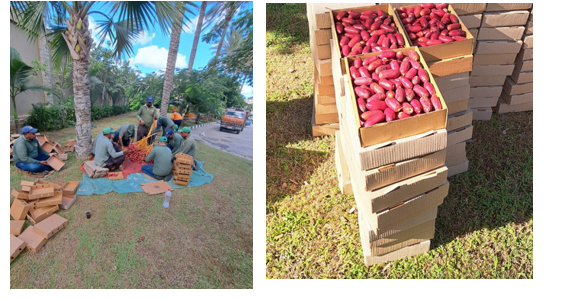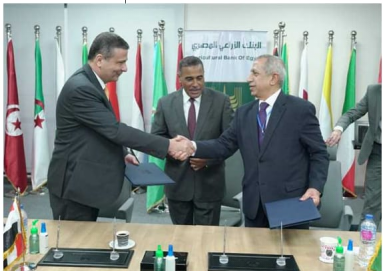
AASTMT has long demonstrated a deep institutional commitment to embedding sustainability within its food systems and dining services. Since the early 2010s, the Academy has actively recognized the environmental and social challenges associated with food production and consumption, integrating sustainable food practices as a central component of its operations, community engagement, and educational philosophy.
AASTMT emphasizes sustainable food practices by sourcing fresh fruits and vegetables from local farmers, supporting the regional agricultural economy while reducing transportation-related environmental impacts. This helps the rural development of areas around the college campuses, as well as support small farmers in their businesses. By encouraging the domestication of locally adapted crop varieties, its dining services promote healthy and balanced choices, implement waste-reduction measures, and provide nutritional support to students in need. Across its campuses in Alexandria, Cairo, Port Said, and Smart Village, the Academy exemplifies how higher education institutions can combine sustainability, community engagement, and student well-being into a socially responsible and cohesive food system. For instance, AASTMT’s ongoing Green Horizon project places local farmers at the core of sustainable land management for tourism and agriculture. The initiative strengthens farmers’ skills in sustainable agriculture and land protection through practical workshops, focused seminars, and partnerships with local and international stakeholders.

Support for Local Farmers on AASTMT webpage
2022-2023
The Arab Academy for Science, Technology, and Maritime Transport (AASTMT) prioritizes sustainable food procurement by sourcing products from local and sustainable suppliers. This strategy supports local economic development, enhances food security, and minimizes environmental impact.
Commitment to Local and Sustainable Sourcing:
Support for Local Farmers and Suppliers:
AASTMT conducts biannual competitive tenders through its purchasing department, selecting suppliers based on cost-effectiveness and quality. Local suppliers are prioritized, contributing to regional economic growth and reducing reliance on imported goods.

Sustainability Initiatives:
By sourcing fresh, seasonal, and locally grown produce, AASTMT minimizes carbon emissions associated with transportation and supports environmentally friendly agricultural practices.
Environmental and Social Impact:
Local sourcing not only reduces the environmental footprint but also strengthens community resilience by creating stable demand for local agricultural products.
Nutritional and Economic Benefits:
Affordable and Healthy Meals:
AASTMT calculates meal prices based on actual supply costs without adding profit margins, ensuring students and staff have access to nutritious, affordable food
Balanced Menus:
Meals prepared with locally sourced ingredients include a variety of proteins, carbohydrates, and fresh produce, promoting health and well-being



2021-2022
AASTMT (Arab Academy for Science, Technology, and Maritime Transport) prioritizes food security by adopting a policy of sourcing all its food from local suppliers. Recognizing the importance of supporting local communities and promoting self-sufficiency, AASTMT ensures that the food provided to its students, staff, and visitors comes from local sources. By doing so, AASTMT contributes to the stability and sustainability of the local food supply chain, strengthens the local economy, reduces reliance on imports, and fosters a sense of food security among its community members. This commitment aligns with AASTMT's dedication to social responsibility and its efforts to create a resilient and self-sustaining environment within its campuses.
The Arab Academy for Science, Technology, and Maritime Transport (AASTMT) has recently forged a memorandum of understanding (MoU) with the Egyptian Agricultural Bank and Matrouh Governorate to offer full scholarships to 47 deserving students from the region. Under this collaborative initiative, these students will have the opportunity to enroll at AASTMT, with all associated costs being jointly covered by the bank and the academy. In addition to financial support, the Egyptian Agricultural Bank will play a crucial role in ensuring food security for these students throughout their period of study. Recognizing the importance of practical training and real-world experience, AASTMT has also partnered with Halwany Brothers, a leading company, to provide both theoretical and practical training to the students. This strategic collaboration aims to foster the exchange of knowledge and skills, offering a high-quality education to the students from Matrouh Governorate and equipping them with the necessary tools for future success in their respective fields. Through this MoU, AASTMT, the Egyptian Agricultural Bank, and Halwany Brothers are collectively working towards empowering and supporting the education and development of talented individuals from the region.
Access to Food Producers
AASTMT is dedicated to offering inclusive, sustainable food options to everyone on campus, taking into account dietary needs and preferences. AASTMT has taken the initiative to provide a wide variety of plant-based meals in response to the growing demand for vegetarian and vegan options as well as the significance of sustainable practises. For people who adhere to these dietary restrictions, there are special vegetarian and vegan food stations or menus available at the university dining facilities. By doing this, AASTMT encourages people to lead healthy, environmentally friendly lives and to choose foods that are sustainable and consistent with their values. Regardless of dietary preferences—vegetarian, vegan, or just curious about plant-based foods—AASTMT's dedication to provide sustainable food options guarantees that everyone on campus.
All AASTMT staff members and students have access to a wide range of reasonably priced and healthful food options all year long on campus. The AASTMT cafeterias and restaurants begin providing various meals and snacks every day from 7 a.m. to 11 p.m. 900 students and staff members are served breakfast, lunch, and dinner on average each day. There is a balanced supply of vitamins, proteins, and carbohydrates in every meal. All of the meals are prepared using premium, fresh ingredients that include a wide range of proteins (such as chicken, beef, fish, and plant-based protein), carbohydrates (such as rice, pasta, and pastries), and seasonal fruits and vegetables to balance out the vitamin and mineral intake.